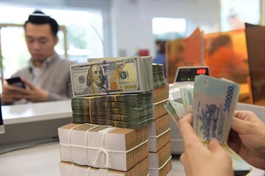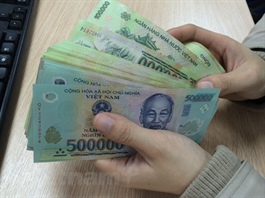State Bank of Vietnam not intervening in OMO
State Bank of Vietnam not intervening in OMO
The State Bank of Vietnam discontinued support to the Treasury Bill (T-Bill) market for the eighth month in a row, and to Open Market Operations (OMO) for the fifth consecutive month.
Illustrative photo.
|
Interbank interest rates for overnight and one-week terms were very low, at 0.11% per year and 0.21% per year, respectively. Two-week term interest rates also dropped to 0.17% per year, breaking lowest bottom in last two years.
Surplus liquidity
According to Bao Viet Securities JSC (BVSC), interbank interest rates remained low at less than 1% per year in the last quarter of the year due to banking liquidity being in surplus. At the same time, the State Bank of Vietnam will likely continue to not intervene in Open Market Operations in coming time.
According to data from Fiin Group, deposit interest rates decreased in October for both six-month and twelve-month terms in all banking groups. For the six-month term, the interest rate of commercial banks with state capital decreased by 0.3%; in group of commercial banks with capital size below VND 5,000 bn they were down 0.072%; and in group of commercial banks with capital size over VND 5,000 bn, they decreased by 0.493%. For twelve-month term, the interest rate for group of commercial banks with state capital continued to drop the most at 0.475%; and for group of small and large commercial banks they decreased 0.052% and 0.323%, respectively.
Popular interest rates on the dong are at 0.1% to 0.2% per year for demand deposits and for terms less than one month. They are 3.3% to 3.9% on per year term deposits from one month to less than six months and 4.4% to 6.2% per year for term deposits from six months to less than twelve months. For a twelve-month term or more the rates are 6% to 7% per year.
The aforementioned movements are somewhat affected by the fact that the State Bank of Vietnam has cut operating rate three times since the beginning of the year. However, the main reason for the drop in interest rates is the high deposit growth compared to lending. According to the General Statistics Office, as of 22 September, credit institution capital mobilization increased by 7.7%, as opposed to 8.79% in the same period in 2019; and credit growth reached 5.12%, as opposed to 8.51% in the same period in 2019.
With such a deposit to lending gap, banks are not obliged to keep high interest rates for capital mobilized in Market 1, and at the same time, there is no high demand for borrowing in Market 2. The interest rate level has also been pushed down due to abundant liquidity.
Information from the Hanoi Stock Exchange (HNX) shows that on the primary market in last ten months, the State Treasury has mobilized VND 260,116 bn in government bonds. This level increased by 17.8% compared to the whole of 2019 and reached 100% of the plan for 2020. In this, the insurance sector is the investor buying government bonds with the largest amount, with proportion of 54% of total volume in the last ten months. The banking industry ranked second with buying volume reaching 45%, while the rest were financial companies and investment funds. Thus, in the last ten months, banks have invested around VND 117,000 bn in government bonds.
The above situation shows that this year banks have invested in government bonds more and much faster than last year. It is inevitable that mobilized capital cannot allow lending. Banks cannot let capital stay unproductive, so they switch to other investment channels, including government bonds. Although the average government bond deposit interest rate in the market in the last nine months was at 2.91%, down 37% compared to 2019, the government bond channel is being favored because of its high liquidity.
Besides government bonds, corporate bonds also strongly attracted capital. In the first six months of 2020, banks purchased a total of VND 38,400 bn of corporate bonds from non-credit organizations in the primary market, equivalent to 31% of the total issuance volume in the market. The third-quarter financial report also showed that a number of corporate bonds in some commercial banks continued to increase.
Specifically, the amount of corporate bonds held by Techcombank were at VND 54,400 bn, an increase of more than VND 24,000 bn compared to the beginning of the year and up by 79% over the same period last year. At TPBank they were around VND 12,703 bn, at MB Bank at VND 27,500 bn and at SeABank they increased 3.5 times than in the same period last year.

























